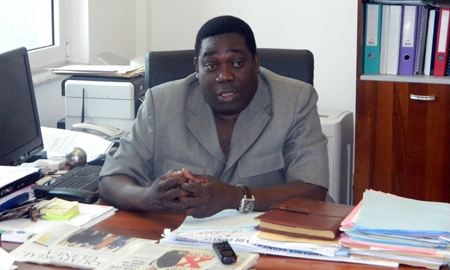The tiny West African nation of Equatorial Guinea, with the peculiarity of a capital city perched on an island offshore, has ambitious plans to become a regional telecommunications leader. The obstacles in its way, including patchy phone service and aging antenna networks, are just a couple of the difficulties that
GETESA, the state-run telecommunications company, wants to eliminate.
The country is effectively leveraging its European partners to build communications networks that make it easier for Africans to speak with their neighbors and also do business with the rest of the world.
Angel Ndongo, General Director of
GETESA, says his country is adapting quickly to new technologies and learning from a series of missteps in order to boost credibility in the highly competitive, dynamic telecommunications industry. Evidence of this progress includes big investments to modernize outdated systems. What’s more, company leaders have made advances in attracting the right mix of partners with the know-how to help the country achieve its telecommunications goals.
“In the past 15 years we’ve gone from marginal demand, to huge demand for all telecommunications services,” says Mr. Ndongo, who leads the telecommunications company following two decades at the helm of the country’s central bank. High-speed Internet, a luxury that still eludes much of Africa, is among the most sought-after services today, Mr. Ndongo says, adding: “We are making a conscious effort to be at the forefront of information and communication technologies.”
Foreign investment in the nation’s telecommunications industry is not new – the French spotted opportunities in Equatorial Guinea as early as the 1980s. France Cable & Radio, a subsidiary of the industry giant France Telecom, entered into a formal agreement with Equatorial Guinea’s government in 1987 to create GETESA. The government put forth 60% of the capital in the deal, while the French contributed the remaining 40%.
“In the past 15 years we’ve gone from marginal demand, to huge demand for all telecommunications services.” Angel Ndongo, General Director of GETESA |
The deal, signed at the beginnings of the adoption of analog cellular phone service, brought major investments in infrastructure. Lapses in management and maintenance, however, led to complaints of dropped calls and areas with no cell coverage at all, among other difficulties. The problems made headlines, spurring
GETESA leaders to change their approach. Mr. Ndongo admits that these missteps were unfortunate, but says the company is correcting them, pointing to investments in infrastructure to cover gaps and ultimately offer greater guarantees to customers.
“What exists now is neither completely trustworthy nor robust. We have to update and continue to build infrastructure so that we reach the entire Equatorial Guinean territory,” Mr. Ndongo says, adding that the company is investing between $30 million and $50 million annually to upgrade the network. Regarding the outcome of some difficult conversations with his French counterparts, he says: “We hope that now the investments will have a positive effect on our installations.”
Recently,
GETESA’s day-to-day operations switched to Equatorial Guinean control, allowing for greater control of investment decisions. But the influence of French capital is still visible in a number of ways. Backed by the brand recognition of French trademark Orange, whose orange logo is highly visible at soccer stadiums across the country,
GETESA has been able to ramp up its profile as a major telecommunications player.
Market penetration in Equatorial Guinea, by North American standards, still remains low. Cell phones reach roughly a fifth of the population, according to Mr. Ndongo. The company nevertheless hopes that the country can take advantage of its limited size, roughly the size of the state of Maryland and offer full coverage to the entire territory.
Events such as the Africa Cup of Nations soccer tournament, bringing together tens of thousands of mobile users, have demonstrated that telecommunication companies in the region have the capacity to meet increasingly demanding consumer needs.
“There are stadiums with 40,000 spectators transmitting data, voice, images, etc ... and we have achieved this in a short time,” Mr. Ndongo said, making specific references to advances in mobile communications.
The General Director realizes, however, that significant challenges remain: “Our time is limited. We achieved a lot in a short amount of time, but now we have to consolidate that. We’re doing studies in the areas that still lack coverage. The antennas are there but the technology isn’t the best. We want to change [the antennas] so that they’re much more effective.”
Still, challenges persist. Though subsea fiber optic cables have already been installed between the capital, Malabo, and the mainland, gaps remain in a major subsea link between Africa and Europe. Mr. Ndongo is confident, however, that “Equatorial Guinea will be ready when the cable arrives.”
The expansion of 3G service across the country is another key goal for
GETESA. This project is being undertaken by the French company Alcatel-Lucent and the Chinese telecommunications company HUAWEI.
Indeed, tiny Equatorial Guinea, the only Spanish-speaking country in Africa in a sea of larger francophone nations, sees telecommunications as a way to elevate its profile.
“As a small country we can’t pretender to do everything but we can do a good job at what we choose, and the world of telecommunications is one of those areas,” Mr. Ndongo says. “We want to have the best telecommunications in Africa, at the very least in our region, and we believe we’ll achieve that. We invite everyone to learn more about us as we will be able to find potential partners, better opportunities.”

0 COMMENTS